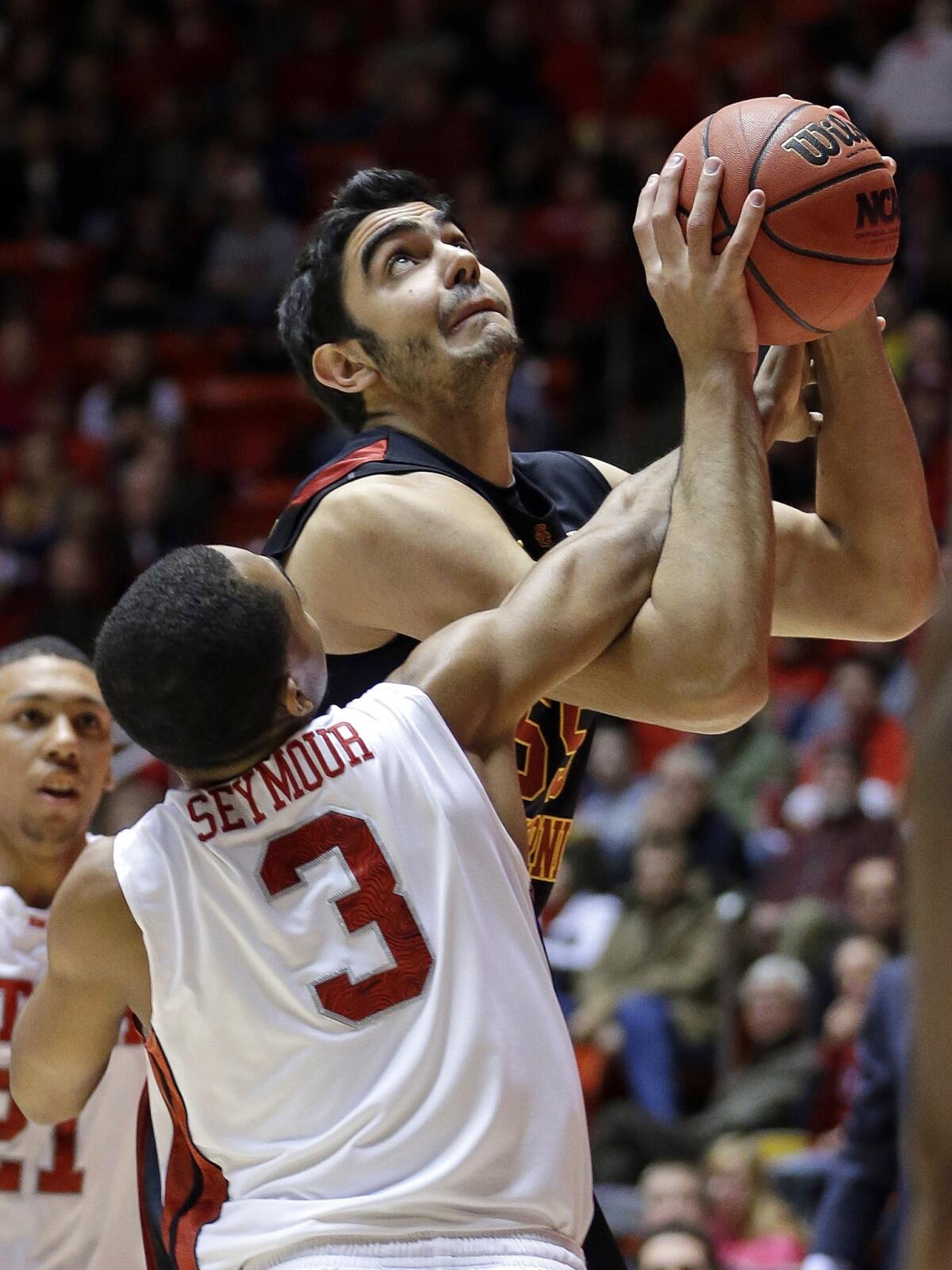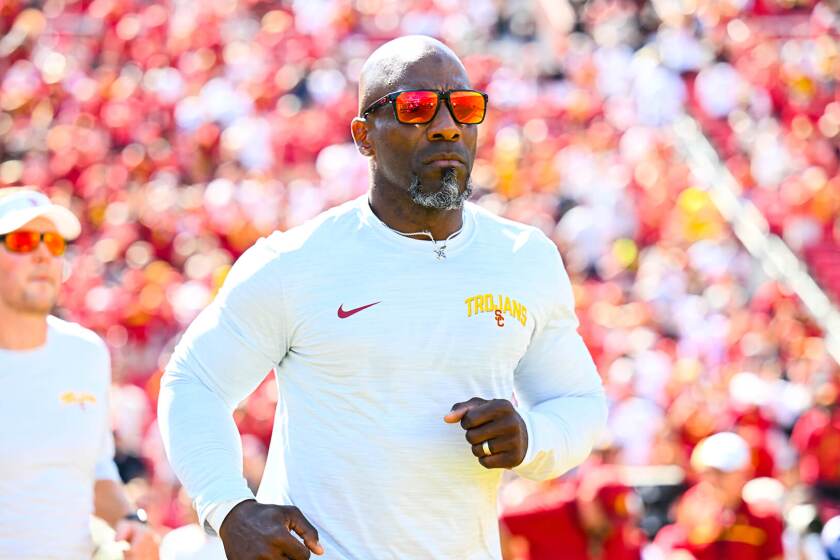USC center Omar Oraby is fueled by Egyptian pride

- Share via
Omar Oraby is 7 feet 2 and stands up straight as a light pole. Sometimes kids who are extremely tall try to look less tall. They hunch their shoulders. They nonchalantly bend their knees.
But Oraby is proud of who he is.
He’s proud of his height. He is proud to be a USC senior and well on his way to a college degree. He is proud to be a basketball player with soft hands, nifty footwork and talent that doesn’t always come naturally to a big man from a country that doesn’t produce many basketball players.
Most of all, Oraby is proud to be Egyptian.
When it seemed his country was crumbling last summer, when U.S. television showed Cairo as a place filled with violence and religious disagreements that were being settled by guns instead of the debate that Oraby finds fascinating in college, he went home anyway.
His Trojans basketball coach, Andy Enfield, said, “I would have preferred he stayed on campus, honestly. I just felt it would be safer, but I also would never refuse to let him go home.”
Oraby went home to see his family and to see what was happening to his country. He’s back, ready to be USC’s starting center, ready to be a star maybe, ready, for sure, to get a degree, and maybe someday ready to go back home and be a leader.
His first love
USC forward J.T. Terrell watched Oraby play a scrimmage this fall, and afterward, after Oraby had made a spin move that resulted in a dunk and had swatted away a couple of shots, Terrell shook his head.
“I wish I was that tall and could do what he does,” Terrell said.
Even in a country where soccer rules and there isn’t really a close second sport, Oraby said he always loved basketball.
“It wasn’t on television much, there weren’t any pickup games, but the very first birthday present my brother and sister got for me by themselves, with their own money, was a basketball,” Oraby said.
“I would go to a club near our house and just play every day, even if it was by myself. I’d be the guard, I’d be the forward, I’d be the center, I’d be everything. One day, when I was very young, maybe only 6 or 7, one of the coaches asked me how old I was. I told him and I don’t think he believed me.
“He measured me and said I was the tallest 6-year-old he had ever seen and asked me to come back the next day to the club. I did and that was it. I was a basketball player.”
Oraby tried playing soccer and volleyball, and he even experimented with swimming. But basketball was his favorite, especially as he kept growing.
By the time he was 15, Oraby said, he was playing for the Egyptian junior national team and had begun watching tape of American stars such as Michael Jordan and LeBron James.
He knew that American colleges often gave talented foreign players scholarships, scouting other African countries and in Europe to turn up hidden gems. But Egypt wasn’t a place that produced stars.
“I didn’t know how things worked,” Oraby said. “I didn’t know how to contact American colleges and I felt no one was coming to see me, but then I played in the junior world championships in New Zealand and an American coach, I’m not even sure who, started to tell people about me.”
Word began to reach the U.S. about Oraby and he ended up being recruited to Rice along with another Middle Eastern player, Arsalan Kazemi of Iran. After two years, Kazemi transferred to Oregon and Oraby left for USC.
Kazemi has said publicly that he was subjected to anti-Muslim verbal abuse by an athletic official at Rice.
Oraby will not say whether that happened to him. But the coach instrumental in recruiting Kazemi and Oraby to Rice, Marco Morcos, an Egyptian, also left the program and is out of coaching. Owls Coach Ben Braun could not be reached for comment on why Kazemi and Oraby left, and the athletic director at the time, Rick Greenspan, is no longer at the school.
“It’s not important,” Oraby said. “But I am in a better place, for my future, both for basketball and for representing a positive image of my country. If I become successful in a positive way in sports and academics, that helps Egypt. Egypt needs good public relations.”
Mutual admiration
Enfield said Oraby is a blessing to have.
“His personality, his willingness to work,” Enfield said. “You can’t help but love that. But also, he has skills you can’t teach. His hands are great, his footwork is good and will get better.”
Oraby said he is enjoying the up-tempo basketball Enfield is bringing to USC. Last year under Kevin O’Neill, who was fired in January, and then under interim coach Bob Cantu, the Trojans played a slower, more restrictive style.
Oraby said Enfield’s fast pace suits him. “Lots of rebounds for me,” he said. “I like getting up and down the court. There will be layups and put-backs.”
When he was home last summer, Oraby said he found his country calmer than what he had seen on U.S. television.
When he’s at USC, he speaks to his family nearly every day via Skype. He said he encouraged Americans to go to Cairo still, to see the pyramids, to support Egypt.
Someday, Oraby said, he’ll go home for good. But first?
“The NBA is something I hope I get to try,” Oraby said. Enfield, for one, sees no reason why that won’t work out. “Who wouldn’t want a 7-2 guy who can play?” Enfield said. “I do.”
Anthony Ibrahim, an Egyptian and a friend of the Oraby family who lives in Houston, said it would be “huge” for Egyptian basketball if Oraby were to play in the NBA. Alaa Abdelnaby, who played at Duke and then was a first-round pick (25th) by Portland in 1990 and played five years in the NBA, is the most prominent Egyptian to play professionally in the U.S.
Ibrahim said Oraby, whose father is a civil engineer who owns an interior design firm in Cairo, told him, “I just want to get away, bust the door open for all the Egyptians, break the mold and write my own script.”
Oraby is still writing it.
First he needs to raise his scoring (6.3 points a game last season) and rebounding average (3.9). It seems possible. Oraby had his best game of the season — 18 points and 12 rebounds — in a season-ending loss to Utah in the Pac-12 tournament.
Until then, he had shared center minutes with Dewayne Dedmon, who was suspended after violating team rules in Spokane, Wash., where the Trojans were playing Washington State. The 7-foot Dedmon departed USC with a year of eligibility left, leaving the center position all for Oraby.
“From that moment in Las Vegas,” Oraby said, “I could hardly wait for this year.”
Friday in Logan, Utah, at Utah State. The moment has almost arrived.
Twitter: @mepucin
More to Read
Go beyond the scoreboard
Get the latest on L.A.'s teams in the daily Sports Report newsletter.
You may occasionally receive promotional content from the Los Angeles Times.






